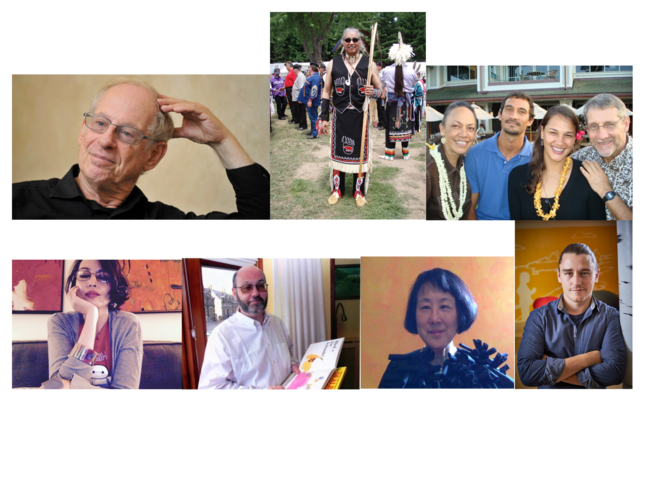
 How can the benefit of international education be made available to all American students, as recommended by a new Congressional report?
How can the benefit of international education be made available to all American students, as recommended by a new Congressional report?
Although last month’s news was dominated by the administration’s actions that depressed prospects for increased international educational exchange, on March 1, the American Academy of Arts and Sciences (AAAS) released its much-anticipated report “America’s Languages: Investing in Language Education for the 21st Century” (see March 2017, p. 9), which recommended that Congress increase federal funding for Americans to study abroad.
The report calls for “a national strategy to broaden access to language education for every student in the U.S., as preparation for life and work in a global 21st century must also promote opportunities for students to travel, experience other cultures, and immerse themselves in languages as they are used in everyday interactions and across all segments of society.”
In its previous “Heart of the Matter” report on the humanities and social sciences, the AAAS recommended that “transnational studies, study abroad, and international exchange programs should be expanded as part of undergraduate education.” Now, it is recommending that “the Department of Education should consider restructuring federal financial aid to help low-income undergraduates enjoy study abroad during the summer, as well as the academic year, to obtain language competence in their specific area of study.” The report recognizes that most study abroad programs “can be expensive—in real dollars, in forfeited income during the period abroad, and in time spent away from home campuses and coursework—and are therefore less accessible to students from disadvantaged backgrounds.” To overcome this, it suggests that colleges should recognize “overseas coursework for either elective or major credit. This recognition would enable students to apply financial aid and student loans to their time abroad, just as they apply it to their home campus studies,” in addition to extending financial aid to cover summer study programs.
Additionally, the report calls for the Departments of State and Defense to expand their successful immersion models. Cited are the examples of the Language Flagship model of the National Security Education Program (NSEP-DoD), which prepares students to speak, read, and listen in a non-English language at a professional level through intensive training at home and during an overseas capstone year, and the State Department’s National Security Language Initiative for Youth (NSLI-Y) and Critical Language Scholarship programs, which support over 1,000 students of critical languages in overseas language study annually.
Not mentioned by the report but surely a source of information for its authors is a 2013 evaluation by Research Solutions International, LLC investigating the Gilman Scholarships’ goals of helping prepare these students to assume significant roles in an increasingly global economy and interdependent world. The evaluation studied the medium- and longer-term outcomes for recipients of the scholarships between the years 2003 and 2010 and also considered the impacts of the scholarships on U.S. higher education institutions and on the families and communities of scholarship recipients.
The U.S. Department of State’s Bureau of Educational and Cultural Affairs (ECA) administers the congressionally mandated Benjamin A. Gilman International Scholarship Program, which offers over 2,800 scholarships of up to $5,000 per academic year for U.S.-citizen undergraduates of limited financial means to study or intern abroad. Award amounts will vary depending on the length of study and student need, but applicants who are studying a critical-need language while abroad in a country in which the language is predominantly spoken will automatically be considered for the Critical Need Language Award, for a total award of $8,000. During the 2015–2016 academic year, 70 Critical Need Language Awards were offered.
According to the evaluation, representation of minorities among Gilman Scholarship recipients well exceeds that of the U.S. study abroad population as a whole. Participation in the program from African American, Latino, and Asian communities is two to three times greater than their participation in U.S. study abroad overall. Just under half of Gilman Scholars in the cohort examined were part of the first generation in their families to enroll in higher education.
The data shows that the Gilman Scholarship is diversifying the kinds of students who study and intern abroad and the countries and regions where they go by offering awards to U.S. undergraduates who might otherwise not participate due to financial constraints. From changed perspectives on the world and new interests in working on global issues to focusing academic pursuits on international topics and deepening foreign language skills, the program has enabled students of limited financial means to develop the knowledge and competencies required to compete in a global economy. See the accompanying table for a more in-depth analysis of the benefits of the program.
Significantly, in light of proposed budget cuts, last month’s AAAS report also recognizes that businesses should become involved in the effort to fund study abroad, as it is in their own interests: “American businesses may have the most to gain from a workforce that is competent in world languages and effective in international settings. Eighty-eight percent of the executives who responded to the 2014 Coalition for International Education–sponsored study reported that international sales will be an equal or greater percentage of their business in the future, and almost two-thirds report a need for international skills at entry and management levels. In other words, the U.S. is rapidly approaching a significant skills gap. Many businesses recognize and address this need by providing language education for their employees through a variety of means, including internal training programs and sponsored coursework. Community colleges have also become important partners by providing effective and affordable language instruction for adults.
In addition, through sponsored internships, the private sector and many NGOs have discovered ways to develop a multilingual workforce that can meet their future needs. Some work through programs like Northeastern University’s Global Co-op, which connects students with professional internships abroad, thereby offering language and cultural training as well as valuable work experience. Even a quick online search reveals dozens of such opportunities for students interested in exploring professional experiences abroad, including programs with Deloitte, Goldman-Sachs, and the World Bank, as well as U.S. embassies, world governments, and a host of other large and small corporate and nonprofit entities. Clearly, it is in the best interests of these organizations, and of U.S business more generally, to recruit and train more talented young people for success in a global economy—and international internships should be a part of any global strategy.”
Some programs are already leveraging commercial funding to boost study abroad. ExxonMobil, Banco Santander, and Coca-Cola are among the investors in 100,000 Strong in the Americas, the signature education initiative in the Western Hemisphere, the goal of which is to increase the number of U.S. students studying in the Western Hemisphere to 100,000 and the number of Western Hemisphere students studying in the U.S. to 100,000 by 2020.
To implement the 100,000 Strong in the Americas Initiative, the Innovation Fund was established as a public-private partnership between the U.S. Department of State, Partners of the Americas, and NAFSA: Association of International Educators. The Innovation Fund awards promote transnational institutional partnerships by leveraging private-sector contributions and commitments by higher education institutions to increase unique study abroad opportunities for students going to and from the Western Hemisphere region.
Similarly, the 100,000 Strong Foundation launched in 2013 to help answer President Obama’s call to deepen Americans’ understanding of China through study abroad, is a public-private partnership to encourage study abroad.
It is the 100,000 Strong Foundation’s mission to promote the expansion and diversification of Americans studying Mandarin and studying abroad in China. The goal is to bridge the gap between cultures, strengthen the bilateral economic and strategic relationship, and enhance global stability.
It remains to be seen when the recommendations of this report will be acted upon, but there can be little doubt that increasing access to study abroad opportunities through grants, scholarships, credit recognition, and the use of financial aid for short summer programs can only benefit the long-term interests of the U.S.
Gilman Scholarship Evaluation Summary
Gilman Scholars: Underrepresented in Study Abroad
The scholarship successfully targeted students who have been traditionally underrepresented and provided additional insight into how the program assists them in overcoming challenges to pursuing international opportunities.
Financial Obstacles: More than three-fourths of survey respondents (79%) reported that financial considerations were a significant challenge in studying abroad. This included both the cost of travel and lost income from leaving a position of employment.
Not the “Typical” Study Abroad Student: In focus groups and interviews, Scholars spoke about seeing themselves differently from “typical” study abroad participants, primarily by virtue of their lower socioeconomic status (SES). Other self-identified characteristics distinguishing them from usual study abroad students included race/ethnicity, older age, having a physical disability, and being a parent. Forty-four percent of survey respondents indicated they were part of the first generation in their families to attend college.
New Academic Opportunities Overseas: In addition to giving recipients access to other countries and cultures, Gilman Scholarships also supported their enrollment in a variety of academic study abroad programs, providing experience with different academic structures and topics, students, activities, and extracurricular experiences than their home institutions. Eighty-three percent of survey respondents indicated that the Gilman Scholarship had enabled them to undertake academic activities overseas that they could not have undertaken at their home institutions.
Shifts in Perspectives
The evaluation results indicate that the Gilman Scholarship supported Scholars in expanding their knowledge of other peoples, cultures, and perspectives.
Shifts in Worldview and Perspective: More than half of the survey respondents (52%) said they had had concerns about living in a foreign culture prior to their study abroad experience. After coming home, the majority (74%) kept up an active interest in the culture of the country where they had studied. Seventy-nine percent followed media coverage on the country or geopolitical region where they had studied. In focus groups, Scholars said that the Gilman Scholarship had provided an opportunity for them to develop an analytic framework through which to observe the world and scrutinize information about it.
International Engagement: After returning home from studying abroad, Scholars sustained their international engagement through a wide range of activities. Eighty-four percent reported maintaining relationships with people from the country where they had studied. Seventy-four percent remained actively interested in the culture of the host country. Two-thirds of survey respondents found opportunities to serve as a bridge between Americans and people from different countries and cultures when they returned to the U.S.
In addition to influencing their peers at school, some Gilman Scholars targeted their educational efforts toward their communities back home, taking the time to share their experiences with people who have less access to international opportunities.
Gaining a Greater Understanding of and Representing American Diversity: In focus-group discussions, several Scholars also described the study abroad experience as clarifying their own American identities and discussed how this understanding influenced their roles as American ambassadors. Scholars who were children of immigrants, raised in the U.S. but identified with their parents’ cultural heritage, found themselves representing American diversity in other countries.
Expanding Disciplines and Degrees of Study: The Gilman Scholarship influenced Scholars’ choices to pursue study of international topics that they might not have previously considered. In some cases, the scholarship catalyzed a desire to pursue graduate studies or professional degrees.
Enhancing Interest in International Study: Of the 1,441 survey respondents who returned to undergraduate studies after their Gilman Scholarships, over 1,250 reported taking a greater interest in international or cross-cultural topics, and more than one-third indicated that they had chosen an academic major or minor field of concentration with an international or cross-cultural focus.
A Decisive Factor in Graduate/Professional Study: Scholars who went on to pursue graduate studies or professional degrees described the Gilman Scholarship experience as a decisive factor in their choice of what to study.
Of the 819 survey respondents who were attending or had already completed graduate or professional school at the time of the evaluation, almost half (48%) had chosen a concentration with an international or cross-cultural focus, and more than one-third (36%) had studied abroad again or pursued international field research. Almost one-third (31%) had written or were writing a thesis/dissertation on an international or cross-cultural topic.
Fellowships, Scholarships, and Certificates: Thirty percent of all survey respondents reported having pursued educational activities inspired by their Gilman Scholarship experiences. Of these, 34% received fellowships or scholarships—the largest portion of that group going abroad again as Fulbright Students (14%). Twenty-three percent reported having pursued professional certificates, including Teaching English as a Foreign Language (TEFL) and Teaching English to Speakers of Other Languages (TESOL).
Enabling Graduate Study: In addition to influencing their academic choices, some Scholars believed that the Gilman Scholarship was the reason they were accepted to graduate school. Whether through the coursework or the international experience—or both—the Gilman Scholarship provided them with the qualifications to make them competitive and better-prepared graduate students.
Effects on U.S. Higher Education
The Department of State also seeks to support the internationalization of American colleges and universities through the Gilman Scholarship and other educational exchanges and related programs. This evaluation probed effects of the Gilman Scholarship on higher education by speaking with university representatives at 42 colleges and universities from a wide range of school types and student populations.
Making Study Abroad Available to a Much Broader Range of Students: University representatives who were interviewed regarding the impact of the Gilman Scholarship on their institutions said that it had contributed to changing perceptions about the kind of student who can study abroad.
Support for Short-Term Programs and Flexible Approaches to Study Abroad for Working Adults: For students who must work during their studies or have familial obligations year round—including many enrolled in community colleges in particular—spending a semester or academic year in another country is difficult or impossible. To allow more students to participate, the Gilman Scholarship has instituted offerings for summer (and now also winter) that are a minimum of four weeks in length (now two weeks for current community college students.) According to university representatives interviewed for this evaluation, STEM majors had difficulty fitting study abroad into their schedules during the regular academic year because of the high number of courses and labs that are required to complete their degrees.
Foreign Language Learning Overseas: Seventy-nine percent of survey respondents studied a foreign language while on their academic study program overseas. They studied a diverse group of languages, with 43% studying romance languages and 28% studying Asian languages. Foreign Language Study after Returning Home: Scholars were asked if they had undertaken specific language-related activities during the period of time when they were undergraduates or graduate or professional school students. A majority of the undergraduates (64%) had either continued or started taking language courses. More than a quarter of graduate/professional students (29%) had taken more foreign language courses. Among Scholars who had studied a foreign language while abroad, more than three-fourths (82%) sought opportunities to speak the language they had studied when they returned home.
 In Santa Fe, New Mexico on October 26-27, 2017, the Indigenous Language Institute is holding it’s 8th annual symposium. The theme of the 8th Annual ILI Symposium 2017 will address the importance of comprehensible input and active listening of the target language for oral language development to create speakers.
In Santa Fe, New Mexico on October 26-27, 2017, the Indigenous Language Institute is holding it’s 8th annual symposium. The theme of the 8th Annual ILI Symposium 2017 will address the importance of comprehensible input and active listening of the target language for oral language development to create speakers.




 National Adult Education and Family Literacy Week was celebrated September 24-30, 2017.
National Adult Education and Family Literacy Week was celebrated September 24-30, 2017. 



 The
The A
A 
 Mentoring Minds is offering Language Magazine readers a special discount on its ELL Strategies Guides which are designed for all educators responsible for ELL instruction.
Mentoring Minds is offering Language Magazine readers a special discount on its ELL Strategies Guides which are designed for all educators responsible for ELL instruction. Germany has continuously been in the news for their practices of welcoming Syrian refugees and offering various programs to teach refugees German. The country has added another method of distribution with a new program that turns 30 mosques across Germany into language schools for refugees. In Berlin, classes are held twice a week in the Dar Assalam mosque. The project differs from how German classes are typically taught.
Germany has continuously been in the news for their practices of welcoming Syrian refugees and offering various programs to teach refugees German. The country has added another method of distribution with a new program that turns 30 mosques across Germany into language schools for refugees. In Berlin, classes are held twice a week in the Dar Assalam mosque. The project differs from how German classes are typically taught.



 How can the benefit of international education be made available to all American students, as recommended by a new Congressional report?
How can the benefit of international education be made available to all American students, as recommended by a new Congressional report?